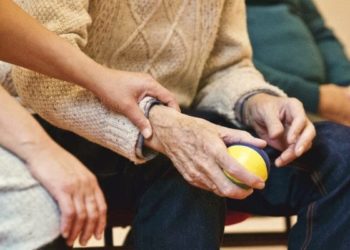Vitamin D supplementation amongst post-menopausal women did not improve functional outcomes
1. In this randomized, controlled trial addressing vitamin D supplementation in post-menopausal women with vitamin D insufficiency, high-dose vitamin D did slightly increase the total fractional calcium absorption compared to low-dose or placebo, but did not have any effect on the bone mineral density when compared to the other two groups.
2. Additionally, there were was no difference in the muscle mass, number of falls, or number of fallers between the three groups.
Evidence Rating Level: 1 (Excellent)
Study Rundown: Osteoporotic fractures are a significant cause of morbidity and mortality amongst post-menopausal women. Decreased vitamin D levels contribute to this by decreased total fractional calcium absorption (TFCA), leading to secondary hypoparathyroidism, increased bone resorption, and decreased bone mineral density (BMD). Despite this, there has not been a consensus on the ideal levels of this vitamin. By many definitions, vitamin D insufficiency (VDI) is a 25(OH)D level less than 30 ng/mL. The purpose of this randomized, controlled trial was to determine the effect of high-dose and low-dose supplementation of vitamin D compared with placebo on TFCA, BMD, and fitness/falls amongst post-menopausal women with VDI. The results of the trial showed that while there was a slight increase in the TFCA in the group receiving high-dose vitamin D supplementation (50,000 IU every 15 days), there was no significant difference in the BMD between the three groups. Additionally, there was no difference in the muscle mass, number of falls, or number of fallers between the three groups.
The major strength of the study was the design, the exact measurements of levels and absorption, and inclusion of functional outcomes (BMD, number of falls, fallers, etc). Weaknesses of the study included the single-center design, lack of ethnic diversity, and the inability to generalize to more than a small subset of the population (i.e., post-menopausal Caucasian women). Also, since the outcomes were measured at 1 year, it might have been too early to detect any meaningful changes in the functional outcomes.
Click to read the study, published today in JAMA Internal Medicine
Relevant Reading: Exercise and vitamin D in fall prevention among older women: a randomized clinical trial.
In-Depth [randomized controlled trial]: This placebo controlled, double blinded study was conducted at a single center in Madison, WI, from 2010 to 2013, with final measurements taken in 2014. Inclusion criteria were post-menopausal women with 25(OH)D level between 14 to 27 ng/mL. Exclusion criteria included age greater than 75, known diagnosis of osteoporosis, use of anti-resorptive medications, known malabsorption comorbidities, and a diagnosis of diabetes mellitus. The three groups included the following: low-dose (800 IU daily), high-dose (50,000 IU every 15 days), and placebo. Each group had a placebo of the other two types. Women were also counseled on calcium intake in an attempt to equalize that variable. The primary outcome was the 1-year change in TFCA, and the secondary outcome was change in BMD.
There were 230 participants that were randomized to the three arms. At the end of the study, the average 25(OH)D levels were significantly different in the three groups: 19 ng/mL in placebo arm, 28 ng/mL in low-dose arm, and 56 ng/mL in the high-dose arm. After controlling for baseline calcium absorption, the TFCA increased 1% in the high-dose arm, but decreased 2% in the low-dose arm, and 1.3% in the placebo-arm. However, there was no significant change in the lumbar spine, mean total hip, or total body BMD amongst the three arms. There were also no significant differences in the muscle mass, number of falls, and number of fallers between the three groups.
Image: CC/Wiki
©2015 2 Minute Medicine, Inc. All rights reserved. No works may be reproduced without expressed written consent from 2 Minute Medicine, Inc. Inquire about licensing here. No article should be construed as medical advice and is not intended as such by the authors or by 2 Minute Medicine, Inc.







